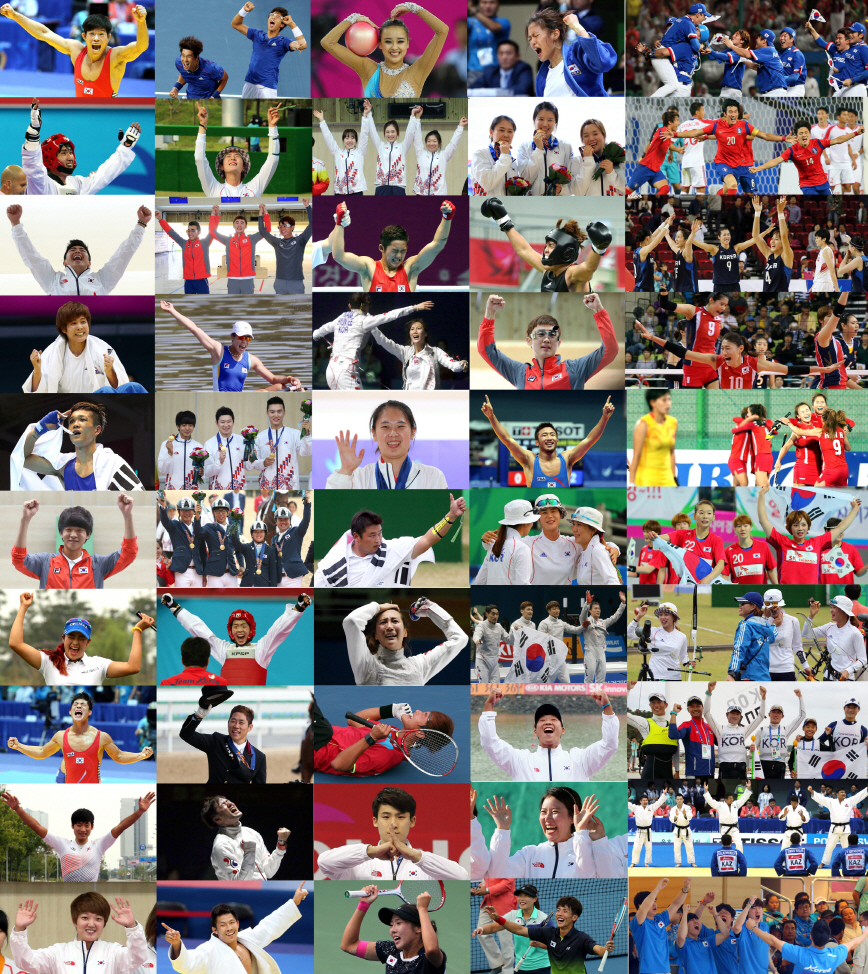- California Assembly OKs highest minimum wage in nation
- S. Korea unveils first graphic cigarette warnings
- US joins with South Korea, Japan in bid to deter North Korea
- LPGA golfer Chun In-gee finally back in action
- S. Korea won’t be top seed in final World Cup qualification round
- US men’s soccer misses 2nd straight Olympics
- US back on track in qualifying with 4-0 win over Guatemala
- High-intensity workout injuries spawn cottage industry
- CDC expands range of Zika mosquitoes into parts of Northeast
- Who knew? ‘The Walking Dead’ is helping families connect
S. Korea to finish 2nd to China for the fifth straight Asian Games
By Jung Min-ho
South Korea will likely finish the Incheon Asian Games with approximately 80 gold medals ― its third-best Asiad result, but its worst-ever on its home turf.
As of Friday afternoon in Incheon, South Korea was in second-place in the medal standings, having earned 75 golds, 68 silvers and 76 bronzes. Given its whopping gap behind leader China and ahead of third-place Japan, any major changes in the table are highly unlikely with athletes competing for only seven gold medals today on the Games’ final day.
China was running away atop the standings with 143 golds, 103 silvers and 81 bronzes, while Japan appeared to be settling for third-place with 46 golds, 71 silvers and 71 bronzes.
Before the Games, South Korean athletes had two missions ― to finish as the runner-up to China for the fifth straight Games, with more than 90 gold medals.
The failure to achieve the latter is largely attributed to the fact that star-status athletes failed to live up to expectations, such as swimmer Park Tae-hwan, gymnast Yang Hak-seon, badminton player Lee Yong-dae and shooter Jin Jong-oh.
As a result, the country won fewer-than-expected gold medals from their sports. Most notably, the number of South Korean golds in shooting dropped to eight from 13 at the Guangzhou Asian Games four years ago, while China earned 27 golds this time around.
But, on the positive side, South Korean fencers, archers and bowlers have proven to be the best in Asia.
The country collected eight gold medals out of the 12 available in fencing to break its previous record of seven set at Guangzhou.
South Korean archers also claimed three of the four gold medals available, while its bowlers collected seven of 12.
Overall, South Korean athletes did a good job, displaying their excellence in almost every sport, but it is also true that their performances fell short of the legacies of their predecessors.
At the 2002 Busan Asiad, South Korea won its most medals ever with 260 ― 93 golds, 55 silvers and 84 bronzes ― while at the 1986 Seoul event, the country garnered 93 golds, 55 silvers and 76 bronzes.
But the Incheon Asian Games were obviously a good chance to see some emerging stars for the country, raising hopes for better results in upcoming international competitions.
One of the most memorable moments for South Korea was Son Yeon-jae wining the country’s first-ever Asiad title in rhythmic gymnastics. .
By individual countries, China has dominated in Incheon, coming in first in the medal standings for the ninth Asian Games in a row, but it also failed to reach its goal of winning more than 200 gold medals.
Japan, another sports powerhouse in Asia, has underperformed, but it seems to be happy to see emerging sports star such as swimmer Kosuke Hagino.
The Japanese dark horse stole the limelight when he raced to the gold in the 200-meter freestyle, beating South Korea and China’s swimming gold contenders Park Tae-hwan and Sun Yang. After the big upset, he continued to produce surprises and will return home with seven medals, including four golds.
Aside from the top three countries in the medal table, Kazakhstan and Iran showed their potentials in various sports, placing themselves in fourth and fifth place, respectively.
Kazakhstan, which has showed its excellence notably in wrestling and weightlifting, placed fifth and fourth at 2010 Gwangzhou and 2006 Doha events, respectively.
Iran finished fourth at the Guangzhou event and sixth in Doha.













![일본 사도광산 [서경덕 교수 제공. 재판매 및 DB 금지]](http://www.koreatimesus.com/wp-content/uploads/2024/07/PYH2024072610800050400_P4-copy-120x134.jpg)


